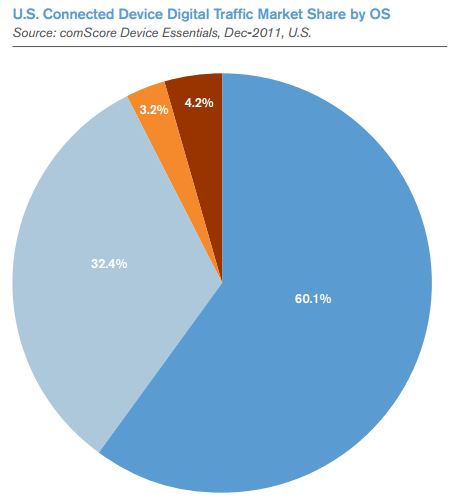Global Android growth is quite mind-boggling. About a month ago Andy Rubin, the father of Android, stated that 900,000 Android devices were being activated every single day. 900,000 – take a minute to let that number sink in.
Obviously, such figures are bound to reflect positively on market share, and although Android was already the leading global smartphone OS in the first quarter of 2011, it has managed to grow its year-on-year market share by almost 20 percentage points – a growth that has come largely at the expense of everyone else than Apple.
Nokia’s Symbian, in particular, has suffered a severe blow in the smartphone market, and the Finnish-founded company, which once was a force to be reckoned with, is currently seeing its stock at an all time low at just $1.84.
Q1 2011 global smartphone OS market share
Source: Gartner
Q1 2012 global smartphone OS market share
Source: Gartner
App developers still favouring iOS
With Android’s astonishing upward trajectory in the year gone by, you could have expected app-developers to follow suit. But the App Store’s now 600,000 available Apps still beats the selection of its rival over at Google, which currently offers some 400,000 Apps specifically designed for Android. And more interestingly, Flurry Analytics notes that Apple continues to garner support from developers. For every 10 Apps built, rougly 7 are for iOS, Flurry further notes.
Android still lags behind Apple in total connected device traffic
Android’s solid lead in market share is not reflected in the amount of connected device traffic. In fact, Apple’s iOS ecosystem (iPhone, iPad, iPod Touch) drives almost twice the amount of traffic that Android does, largely due to the iPad’s dominance in the tablet market. Although the chart below is for the US market only, this trend likely applies globally as well.
Source: comScore
Apple’s ecosystem much more profitable
Whether we like it or not, money talks. From a developer’s perspective, a higher degree of mobile media/App consumption equals higher revenue. Furthermore, the iOS ecosystem means that the cost connected to building and distributing Apps will often be lower, as developers will not have to build separate Apps for iPhones and iPads, but can rely on that one version and reach a large – and most importantly – active audience. And the difference in profitability is indeed striking. “For every $1.00 a developer earns on iOS, he can expect to earn about $0.24 on Android”, Flurry calculates.
A general lesson for publishers and marketers
As I have been making my way through this post, I have come to think that there is a broader lesson in here for both publishers and marketers, which is not only related to mobile but marketing in general.
We have long distinguished between quantitative and qualitative KPIs (e.g. #impressions vs. engagement). But while there is a general consensus that engagement is a lot more telling when measuring the effect of your marketing initiatives, there is still a tendency in most industries to present and focus on quantitative metrics – most likely because these are more easily accessible.
So when Andy Rubin proudly states that there are now 900,000 Android devices being activated every day, and that Google’s mobile OS keeps distancing itself from its competitors in terms of user numbers, what does that really tell us? It tells us there is potentially a large audience to target, but it says absolutely nothing about the actual value of this audience.
If you are a publisher, quantitative metrics are obviously good to know and show off to advertisers, but please focus on the qualitative values of your specific audience and how marketers can connect with them emotionally, rather than your sheer reach.
Similarly, if you are a marketer and have some money to spend, please spend that money on carefully selected platforms where it is possible to emotionally connect with your target audience.










